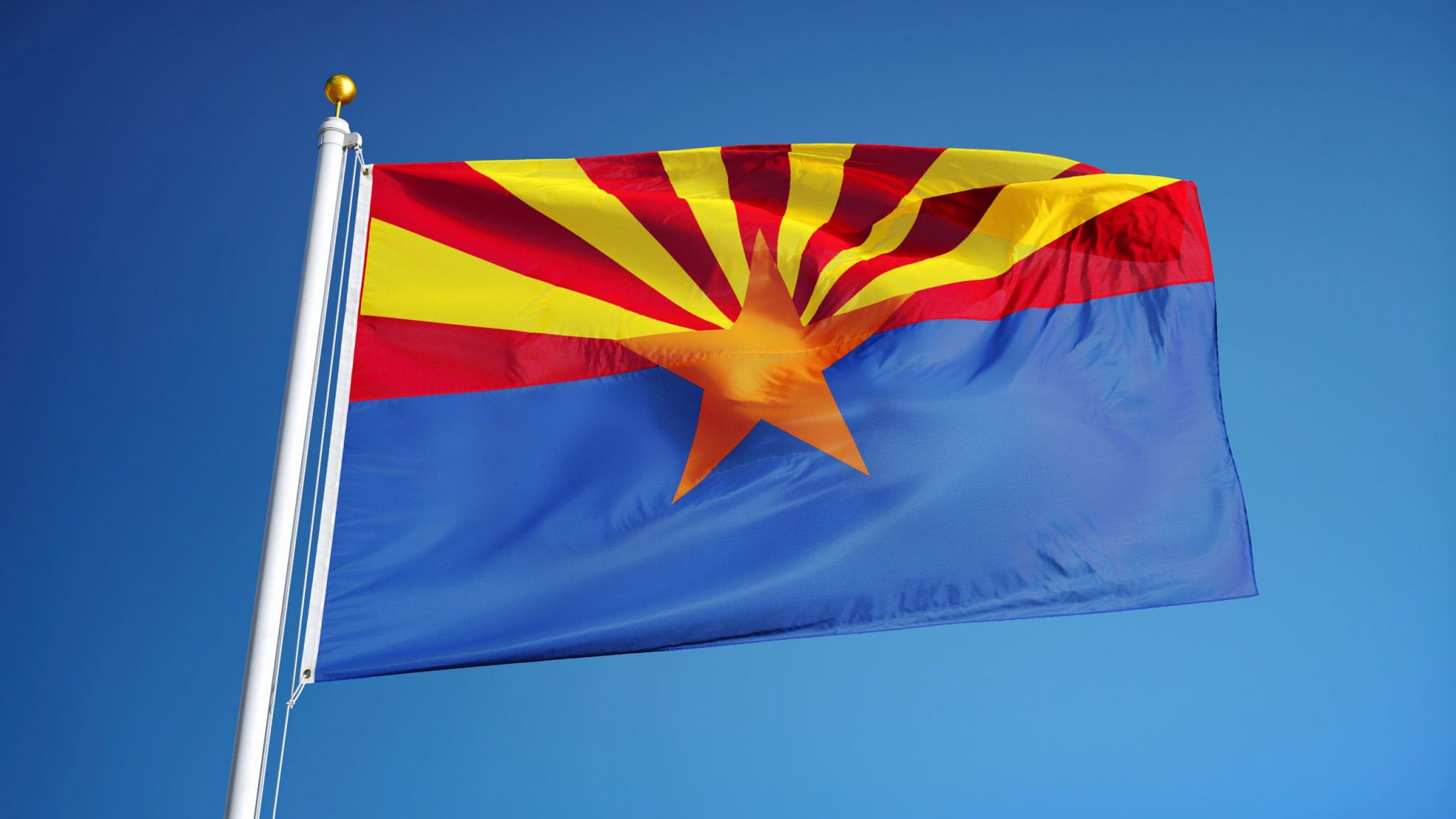The Midterm Monitor is an interactive tool that provides a snapshot of social media messages and narratives shaping the conversation around voting and election administration in the leadup to the 2022 midterm elections. The Midterm Monitor tracks social media posts for a subset of candidates for office, news outlets, and other key messengers. Learn more.
This week, the Midterm Monitor Report dives into the battleground state of Arizona, a state Meet the Press labelled “ground zero” for election denialism. A few takeaways:
- Midterm contests in Arizona are drawing a lot of national media attention. Among monitored national media outlets and pundits, Arizona was the second most mentioned state (after Georgia) in election-related Facebook and Instagram posts between September 14 and October 13.
- Of the 67 Tweets made by monitored media outlets or candidates containing the term “election denier” between October 1 and 19, 17 (25 percent) were made by or about candidates in Arizona or made general reference to election denialism in Arizona. But the most referenced candidate in those tweets was not an Arizonian but a Georgian: Democratic gubernatorial candidate Stacey Abrams.
- The Republican and Democratic candidates for Arizona secretary of state—Mark Finchem and Adrian Fontes—ranked, respectively, as the first and second most retweeted secretary of state candidates nationwide between September 14 and October 13.
- On Facebook, Kari Lake’s page dwarfed those affiliated with all other candidates, as the Republican gubernatorial candidate’s page received more reactions than all other monitored Arizona candidates combined between September 14 and October 13. She also had nine of the ten most reacted to posts during the studied period.
- Monitored candidates in Arizona also regularly attacked the media. Thirteen of the 15 uses of the hashtag #fakenews made by monitored candidates nationwide between September 14 and October 13 were made by secretary of state candidate Mark Finchem, who also repeatedly attacked an Arizona Daily star columnist, accusing him, without evidence, of being on the payroll of his opponent and George Soros.
Battleground State Deep Dive: Arizona
Most Influential Candidates on Social Media
Although there were more monitored Arizona Democrats than Republicans among the ten most retweeted candidate accounts on Twitter between September 14 and October 13, Republican candidates occupied three of the top five spots—led by GOP gubernatorial candidate Kari Lake. Lake received more than twice the number of retweets as the second most retweeted account, which belonged, perhaps not coincidentally, to her opponent, Democrat Katie Hobbs. During the studied period, both candidates ranked among the ten most retweeted candidates for governor, with Lake and Hobbs ranking third and seventh, respectively, among monitored gubernatorial candidates. Although the Republican and Democratic candidates for Arizona secretary of state, Mark Finchem and Adrien Fontes, ranked as the fifth and seventh most retweeted candidates among all monitored candidates in Arizona, they ranked as the first and second most retweeted secretary of state candidates nationally.
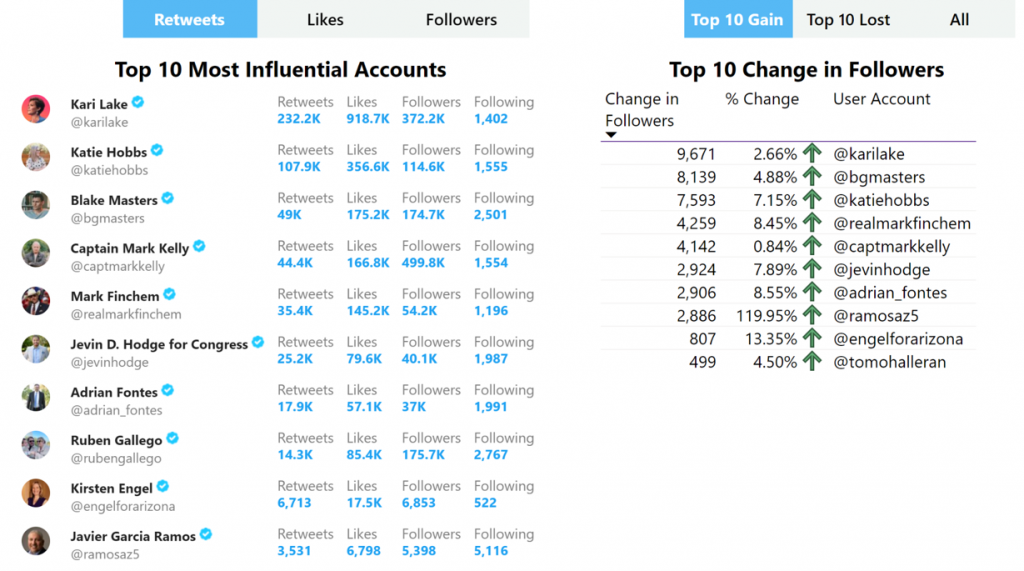
The most influential Twitter accounts affiliated with monitored candidates in Arizona between September 14 and October 13, rank ordered by retweets
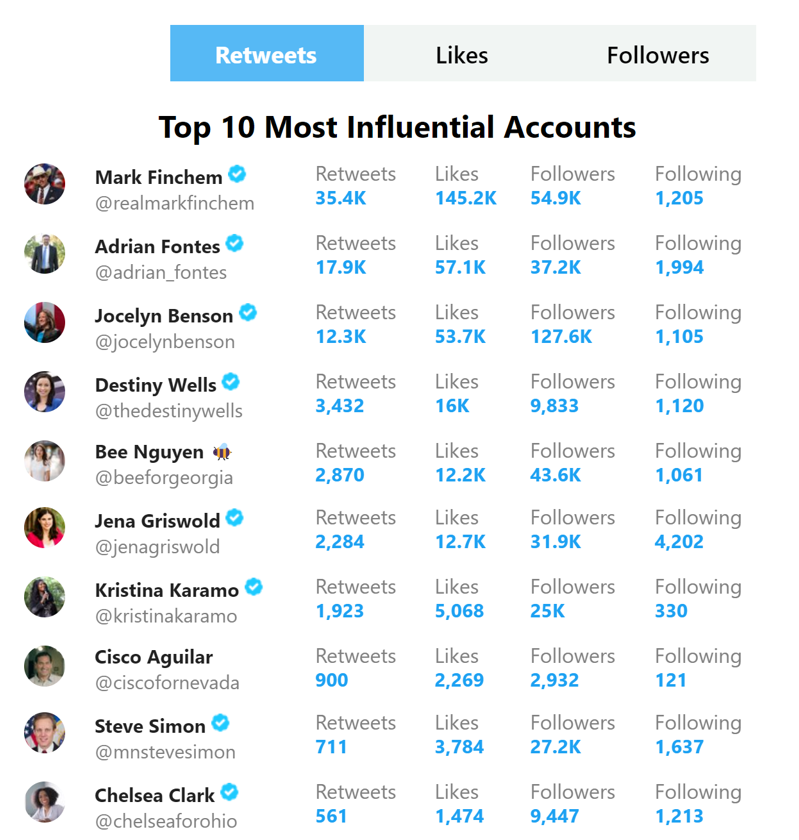
The most influential Twitter accounts affiliated with monitored secretary of state candidates between September 14 and October 13, rank ordered by retweets.
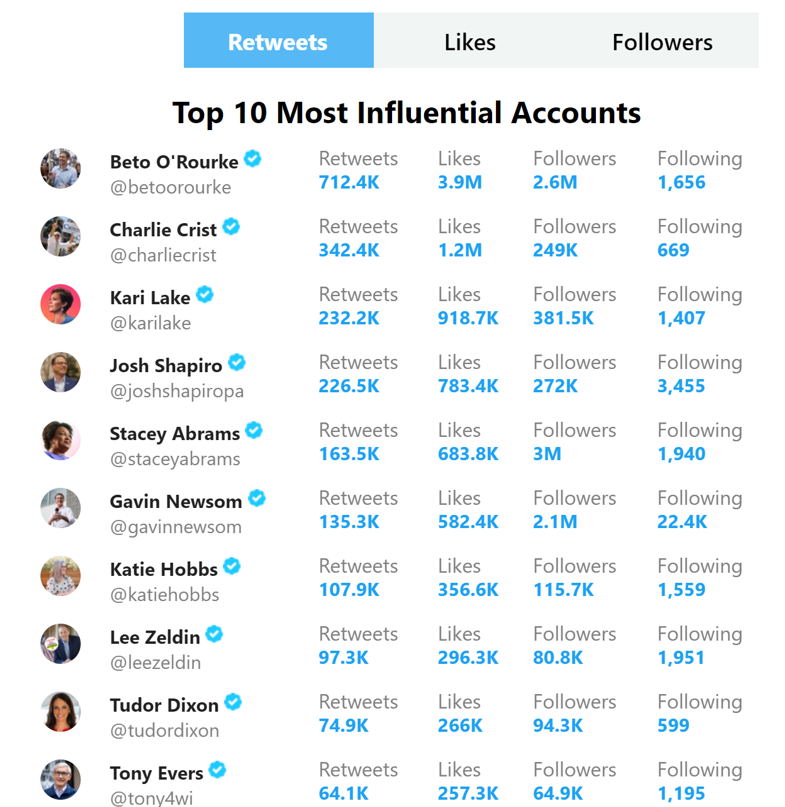
The most influential Twitter accounts affiliated with monitored gubernatorial candidates between September 14 and October 13, rank ordered by retweets.
On Facebook, Kari Lake’s page dwarfed those affiliated with all other candidates, as the Republican gubernatorial candidate’s page received more reactions than all other monitored Arizona candidates combined between September 14 and October 13. She also had nine of the ten most reacted to posts during the studied period.
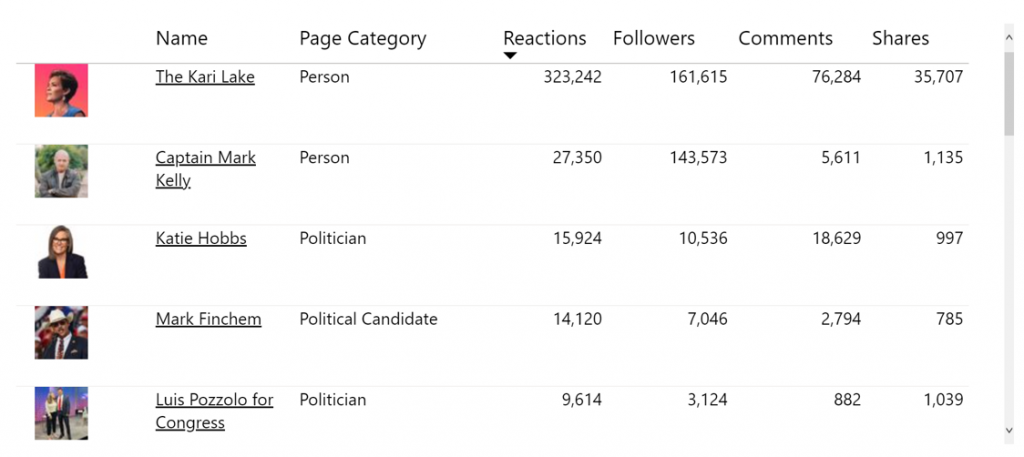
The most influential Facebook pages affiliated with monitored candidates in Arizona between September 14 and October 13, rank ordered by reactions.
National Media Focused on the Arizona Midterms
Between September 13 and October 14, Arizona was the second most mentioned state on both Instagram and Facebook in election-related posts made by monitored national media accounts. The most engaged-with story during that period was Wyoming Republican Liz Cheney’s announcement that she would cross party lines to support Katie Hobbs for Arizona governor.
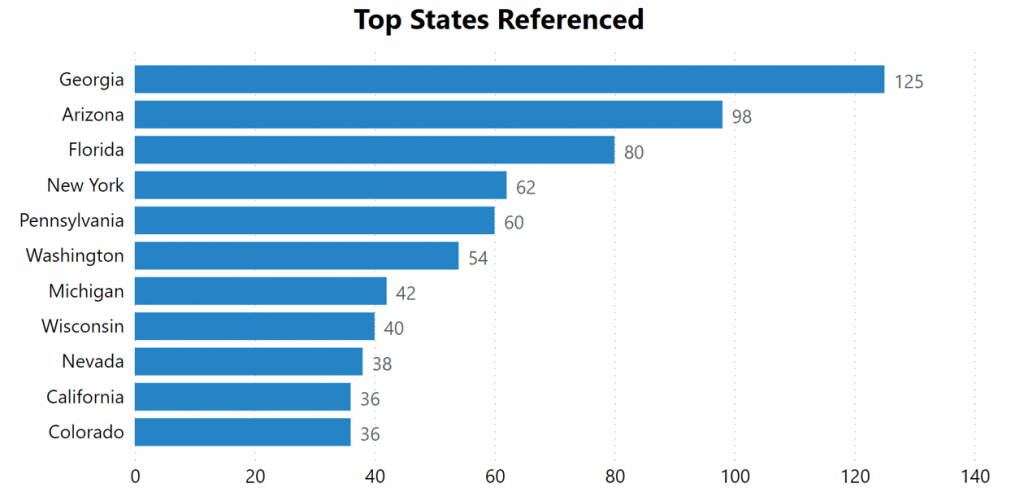
The most mentioned states by monitored national media accounts on Facebook between September 14 and October 13.
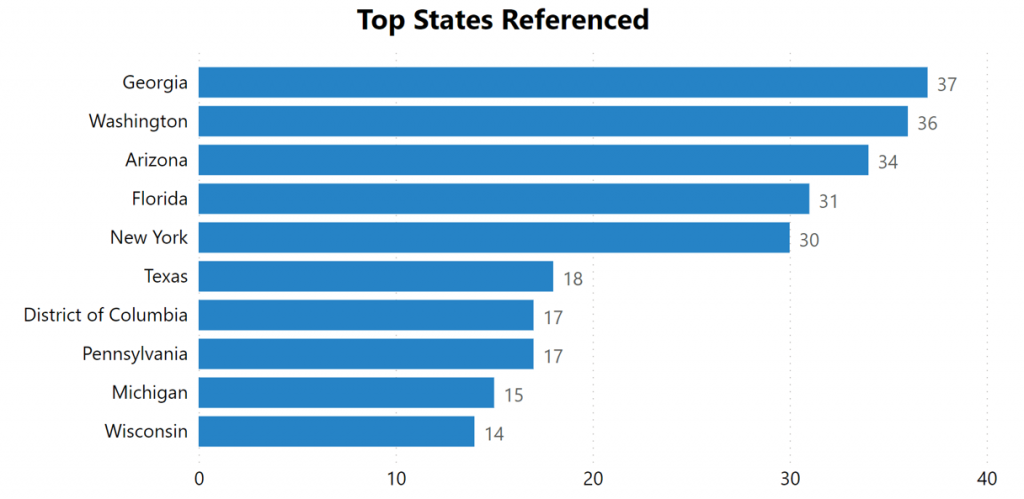
The most mentioned states by monitored national media accounts on Instagram between September 14 and October 13. NOTE: The vast majority of mentions of “Washington” are false positives for Washington, D.C. Arizona was therefore determined to be the second most mentioned state.
Election Denialism is a Focus of Both Republican and Democratic Candidates
Of the 67 Tweets made by monitored media outlets or candidates containing the term “election denier” between October 1 and 19, 17 (25 percent) were made by or about candidates in Arizona or made general reference to election denialism in Arizona. But the most referenced candidate in those tweets was not an Arizonian but a Georgian: Democratic gubernatorial candidate Stacey Abrams. This came after Kari Lake criticized CNN and the media more generally for not referring to Abrams as an ”election denier” due to Abrams’ assertions that there was widespread voter suppression in the 2018 Georgia gubernatorial election. Lake’s critique was subsequently cited by several national pundits. Lake also took aim at the term “election denier,” highlighting a Fox News’ host’s argument that the term is used to stigmatize candidates in the same vein as calling someone a “Holocaust denier.” Lake is classified as an election denier by States United and has repeatedly been called an election denier by her opponent, Katie Hobbs.
Secretary of State Candidate Promotes Baseless Claims about Local Media and Election Systems
Almost 70 percent of mentions of billionaire philanthropist and Democratic megadonor George Soros made by monitored candidates nationwide between September 14 and October 13 came from Arizona Republicans, led (by a wide margin) by Mark Finchem (41 mentions). Finchem accused Soros of bankrolling local reporters; rigging elections and voter rolls; and funding the ERIC system (Eric is an organization used to cross-check voter rolls across state lines that is funded entirely by member states. Finchem’s claim was rated “false” by Politifact.). Finchem also was responsible for 13 of the 15 uses of the hashtag #fakenews made by monitored candidates nationwide between September 14 and October 13, and he repeatedly attacked an Arizona Daily star columnist, accusing him, without evidence, of being on the payroll of his opponent and Soros. Finchem’s most retweeted tweet of the studied period was one where he requested the “arrests of a few election fraud criminals” as a Christmas present.
The views expressed in GMF publications and commentary are the views of the author alone.

